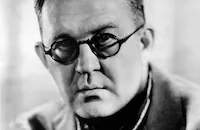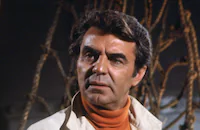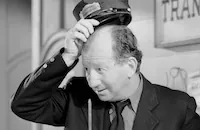When Willie Comes Marching Home
Brief Synopsis
Cast & Crew
John Ford
Dan Dailey
Corinne Calvet
Colleen Townsend
William Demarest
James Lydon
Film Details
Technical Specs

Synopsis
In 1941, when news of the Japanese attack on Pearl Harbor reaches the small town of Punxatawney, West Virginia, Bill Kluggs, an upstanding young student, enlists in the army and earns the distinction of being the first resident of Punxatawney to join the wartime service. After bidding farewell to his sweetheart Marge Fettles, Bill leaves for basic training at Fort Wayne, Missouri. Following basic training, Bill and his regiment are dispached to Punxatawney, the site of the new Loring Field base, where Bill is told that he will be briefly stationed before being sent out to fight. Although Bill's visit at home starts well, when the town gives him a grand homecoming celebration, the good cheer soon begins to fade when Bill's assignment in Punxatawney is repeatedly extended. Bill makes many desperate requests to be sent out to fight but they prove futile, and his brief stop eventually turns into a two-year stay in Punxatawney. Bill's commander refuses to ship him out because he is too good as a gunnery instructor and is needed at home to train soldiers. With time, the townspeople begin to resent Bill's presence and soon ignore and ridicule him. Bill's big break finally comes when he is needed to fly a B-17 to England but, because there have been so many false starts, Bill's parents barely take notice of his departure. While crossing the Atlantic in bad weather, Bill falls asleep and misses orders from the cockpit to bail out. When he awakens, Bill realizes that he is in danger and parachutes to safety. Safety is not at all what Bill finds, however, when he discovers that he has landed in Nazi-occupied France. Soon after hitting the ground, Bill is taken captive by a French woman named Yvonne and her cohorts, who are a part of the French Resistence. Yvonne and the others are filming the launching of a rocket from a secret launch pad and decide to use Bill to help them smuggle their film out of the area. As part of their plan, Bill is disguised as a Frenchman and a fake wedding between he and Yvonne is staged. The plan is a success, and Bill and the film arrive safely in London. Bill is then sent back the United States, where, after he identifies a photograph of Yvonne for Pentagon officials, he is told that he has played a vital role in finding the location of top secret mission sites that are essential to American intelligence operations. Having left Punxatawney only four days earlier, Bill returns home disoriented and exhausted, and is mistaken for a prowler by his father, who knocks him unconscious. His father later dismisses his story of the four-day ordeal as nonsense until military police arrive at the Kluggs's to escort Bill to Washington, D.C., where he is to receive a personal decoration by the President of the United States.

Director

John Ford
Cast

Dan Dailey

Corinne Calvet
Colleen Townsend

William Demarest

James Lydon
Lloyd Corrigan

Evelyn Varden
Kenny Williams
Les Clark

Charles Halton

Mae Marsh
Jack Pennick
Frank Pershing
Gilchrist Herman
Peter Ortiz
Luis Alberni
John Shulick
John Mckee
Clarke Gordon
Robin Hughes
Cecil Weston
Harry Tenbrook
Russ Clark
George Spalding
James Eagles
Harry Strang

Alan Hale Jr.
George Magrill
Hank Worden

Larry Keating
Dan Riss
Robert Einer

Russ Conway
Ann Codee
Ray Hyke
Gene Collins

James Flavin
David Mcmahon
Charles Trowbridge
Michael Alvarez
Jack Boyle
Harry Mack
Jack Barnett
Don Hicks
Allen Church
Arthur Walsh
Beau Anderson
John Duncan
Joe Hartman
William Hawes
Barney Elmore
Tiny Timbrell
Norman Bergman
Louis Mercier
Albert Morin
Lee Macgregor
Paul Bryar
Robert Patten
Mike Mahoney
Fred Graham

J. Farrell Macdonald
Everett Glass

Gregg Barton

Paul Harvey
John Mcguire

Ken Tobey

Harlan Warde
Otto Reichow
George Blagoi
William Yetter
Frederick Brunn
Felippa Rock
Carol Savage
Michael J. Dugan
Fred Libby
Harry Lauter
Wilton Graff
Edwin Mills
George Edwards
Ted Jordan
William R. Klein
Mickey Mccardle
Don Hayden
Clyde Cook

Paul Picerni
John Mitchum
Peter Camlin
Tim Huntley
Don Kohler
Gil Stuart
Keith Mcconnell
Lloyd Dawson
Mimi Doyle

Hank Mann
Sally Yarnell
Frank Johnson
Major Sam Harris
Crew
John W. Adams
James B. Clark
Chester Gore
Eugene Grossman
Roger Heman
William James
Fred Kohlmar
Charles Le Maire
Thomas Little
Mary Loos
Bruce Macdonald
Jimmy Mchugh
Alfred Newman
Ben Nye
R. J. Pennick
Edward Powell
Richard Sale
John N. Scott
Fred Sersen
Wingate Smith
Leo Tover
William Travilla
Lyle Wheeler
Kenny Williams
Leo Wood

Film Details
Technical Specs

Award Nominations
Best Writing, Screenplay
Articles
When Willie Comes Marching Home
Variety enthused that "credit for the laugh-fest can be spread among Dailey and the rest of the cast, the excellent script and all connected with the production. But the major share goes to John Ford. Ford turns to comedy for the first time and demonstrates that a laugh-film can also be his forte."
Regardless of his eventual impact on When Willie Comes Marching Home, Ford came to the project under slight duress. After a major blow-up with 20th Century-Fox president Darryl F. Zanuck over Ford's aborted direction of Pinky(1949), Zanuck took away the director's next preferred project, a comedy-Western called A Ticket to Tomahawk (1950). It was a picture Ford looked forward to making. Instead, Zanuck gave Ford When Willie Comes Marching Home, a Richard Sale-Mary Loos script based on a true-life story by Sy Gomberg. It was about an episode in Gomberg's own military career when he was shipped out on a Friday, shot down a Japanese plane over the weekend, and returned to the base on Monday. Coincidentally, Sale was assigned the direction of Ford's favored comedy-Western. To assuage his bruised feelings, Ford decided to stick it to Sale by telling Zanuck, "I want the talented one on my set," meaning Loos.
Despite his grumblings, Ford always spoke warmly of When Willie Comes Marching Home, one of the few comedies he made after the war. "I'm essentially a comedy director, but they won't give me a comedy to do," Ford once complained. However, Ford, a decorated World War II veteran, didn't try to make the war sequences funny. Peter Bogdanovich asked him about this in an interview, to which Ford replied, "Well, that was my racket for awhile, and there wasn't anything funny about it."
Producer: Fred Kohlmar
Director: John Ford
Screenplay: Sy Gomberg, Mary Loos, Richard Sale
Cinematography: Leo Tover
Film Editing: James B. Clark
Art Direction: Chester Gore, Lyle Wheeler
Music: Alfred Newman
Cast: Dan Dailey (William Kluggs), Corinne Calvet (Yvonne), Colleen Townsend (Marge Fettles), William Demarest (Herman Kluggs), Jimmy Lydon (Charles Fettles), Lloyd Corrigan (Major Adams).
BW-82m.
by Scott McGee

When Willie Comes Marching Home
Kenneth Tobey (1917-2003)
Born in Oakland, California on March 23, 1917, Tobey originally intended to be a lawyer before a stint with the University of California Little Theater changed his mind. From there, he went straight to New York and spent nearly two years studying acting at the Neighborhood Playhouse, where his classmates included Gregory Peck, Eli Wallach and Tony Randall. Throughout the '40s, Tobey acted on Broadway and in stock before relocating to Hollywood. Once there, Tobey soon found himself playing a tough soldier in films like I Was a Male War Bride and Twelve O' Clock High (both 1949); or a tough police officer in Kiss Tomorrow Goodbye and Three Secrets (both 1950). Such roles were hardly surprising, given Tobey's craggy features, unsmiling countenance and rough voice.
Needless to say, no-nonsense, authority figures would be Tobey's calling for the remainder of his career; yet given the right role, he had the talent to make it memorable: the smart, likeable Captain Hendrey in The Thing From Another World (1951); the gallant Colonel Jack Evans in the "prehistoric dinosaur attacks an urban center" genre chiller The Beast from 20,000 Fathoms (1953, a must-see film for fans of special effects wizard, Ray Harryhausen; and as Bat Masterson, holding his own against Kirk Douglas and Burt Lancaster in Gunfight at the O.K. Corral (1957).
Television would also offer Tobey much work: he had his own action series as chopper pilot Chuck Martin in Whirlybirds (1957-59); and had a recurring role as Assistant District Attorney Alvin in Perry Mason (1957-66). He would also be kept busy with guest appearances in countless westerns (Gunsmoke, Bonanza, The Virginian) and cop shows (The Rockford Files, Barnaby Jones, Ironside) for the next two decades. Most amusingly, the tail end of Tobey's career saw some self-deprecating cameo spots in such contemporary shockers as The Howling (1981); Strange Invaders (1983) and his role reprisal of Captain Hendry in The Attack of the B-Movie Monsters (2002). Tobey is survived by a daughter, two stepchildren, and two grandchildren.
by Michael T. Toole
Kenneth Tobey (1917-2003)
Quotes
Trivia
Notes
According to information in the Twentieth Century-Fox Records of the Legal Department at the UCLA Arts-Special Collections Library, a March 1949 draft of the screenplay for this film was entitled Rise and Shine. A working title for this film was Front and Center. The legal records also indicate that Twentieth Century-Fox purchased the rights to Sy Gomberg's short story for $10,000 in March 1945, and that some filming took place on Santa Catalina Island and at the Conejo Valley Airport in Thousand Oaks, CA. While the Call Bureau Cast Service lists Paul Picerni in the role of Kerrigan and John Mitchum in the role of Schreves, studio records dated earlier list Mickey Simpson as "M. P. Kerrigan" and Don Summers as "M. P. Schreve." The Variety review erroneously notes that this was director John Ford's first comedy. Ford made comedies prior to and following this film, and in 1952 he reteamed Dan Dailey and Corinne Clavet in the comedy What Price Glory. A biography on director John Ford quotes Ford as having said that this film was "one of the funniest films ever made." In 1950, Gomberg received an Academy Award nomination for Best Original Story.














